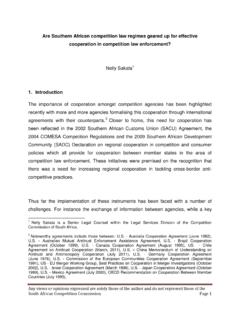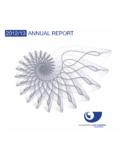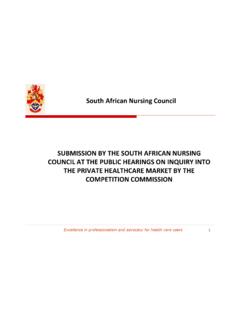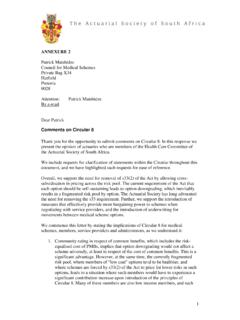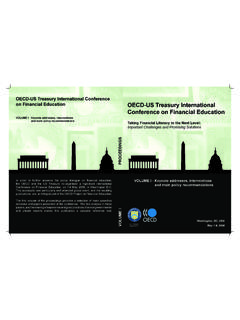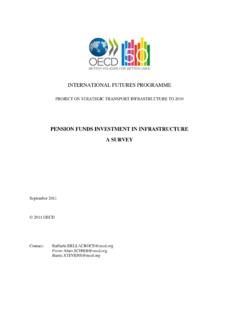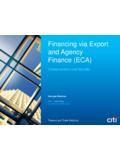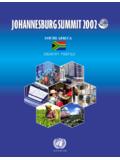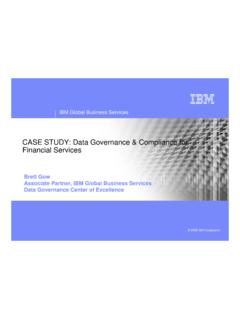Transcription of Our Purpose and Function - CompCom SA
1 The Competition Commission of South Africa was established in terms of the Competition Act (89 of 1998), as amended (the Act). Its Purpose is to promote and maintain competition in South Africa in order to: promote the efficiency, adaptability and development of the economy provide consumers with competitive prices and product choices promote employment and advance the social and economic welfare of South Africans expand opportunities for South African participation in world markets and recognise the role of foreign competition in the Republic ensure that small and medium sized enterprises have an equitable opportunity to participate in the economy promote a greater spread of ownership, in particular to increase the ownership stakes of historically disadvantaged achieve these purposes, the Commission s core functions are to.
2 Implement measures to increase market transparency implement measures to develop public awareness of the provisions of the Act investigate and evaluate alleged anti-competitive conduct grant or refuse applications for exemption from the application of the Act authorise, with or without conditions, prohibit or refer mergers of which it receives notice negotiate and conclude consent orders refer matters to the Competition Tribunal of South Africa (the Tribunal), and appear before the Tribunal when required negotiate agreements with any regulatory authority to coordinate and harmonise the exercise of jurisdiction over competition matters within the relevant industry or sector and to ensure the consistent application of the principles of the Act participate in the proceedings of any regulatory authority advise, and receive advice from, any regulatory authority over time, review legislation and public regulations, and report to the Minister concerning any provision that permits uncompetitive behaviour deal with any other matter referred to it by the Tribunal.
3 Our Purpose and FunctioniThe Commission currently has six divisions that are responsible for the day-to-day implementation of its strategic priorities and plans. The Commissioner and the Deputy Commissioner provide overall guidance to the organisation. Nandi Mokoena*Manager: Strategyand Stakeholder RelationsSimon RobertsChief Economist and Manager: Policy and ResearchKeith WeeksManager: Enforcement and Exemptions Wendy MkwananziChief Legal Counsel and Manager: Legal ServicesMaarten van HovenManager: Mergers and AcquisitionsNellie PillayChief Financial Officer and Manager: Corporate ServicesJohan DreyerCompany SecretaryExecutive CommitteeShan RamburuthCommissionerTembinkosi BonakeleDeputy CommissionerNotes: * Resigned in February 2010 and was replaced by Oupa Bodibe. iiAspen Pharmacare Holdings Limited (Aspen) Business Unity South Africa (BUSA)Cape Town Iron and Steel Works (Cisco)Confederation of South Africa Trade Unions (COSATU)executive committee (Exco)Federation of Unions of South Africa (FEDUSA)Franchise Association of Southern Africa (FASA)GlaxoSmithKline South Africa (Pty) Limited (GSK)high density polyethylene (HDPE)Independent Communication Authority of South Africa (ICASA)International Competition Network (ICN)International Development Research Centre (IDRC)National Economic Development and Labour Council (NEDLAC)National Union of Metalworkers of South Africa (NUMSA)Organisation for Economic Cooperation and Development (OECD)Pay-as-you-earn (PAYE)polyvinylchloride (PVC)South African Development Community (SADC)South African Iron and Steel Institute (SAISI)
4 South African Local Government Association (SALGA)Southern African Bitumen Association (SABITA)Southern African Customs Union (SACU)Southern and Eastern African Competition Forum (SEACF)United Nations Conference on Trade and Development s (UNCTAD)Acronyms and AbbreviationsCommissioner s Overview 2 Part 1: Prioritisation and Impact 4 Part 2: Reports from the Divisions 12 Enforcement and Exemptions 13 Mergers and Acquisitions 17 Legal Services 20 Policy and Research 24 Strategy and Stakeholder Relations 27 Our People and Resources 33 Part 3: Governance 36 Part 4: Financial Statements 40 Part 5: Performance against Targets 78 Table of Contents12 Enforcement for impactThe annual report for the 2009/10 financial year records the activities that took the Competition Commission to its first decade of existence. Indeed, the Commission s tenth anniversary is a significant milestone in the trajectory of steady growth that the competition authorities have enjoyed.
5 This milestone was celebrated at the third annual competition conference, held in early September 2009. The conference was of wider scope than in previous years and hosted delegates from a broad base of interest groups. These included: competition authorities from across the globe, including from Africa; scholars and academics; government departments; legal practitioners and other professionals; and former staff members of the Commission. It was an appropriate time to pay tribute to the work of the founders of the competition authorities, who provided the solid foundation from which it has been able to grow. The Competition Commission is clearly continuing on its growth path. It is a highly respected institution locally and internationally, responding effectively to the challenges of the local and international environment.
6 The Commission s three-year strategies are carefully devised to give direction and vision to the organisation s activities, and to use its resources intelligently. The 2006-2009 strategic plan, which had guided the Commission through a significant growth phase, came to an end in the year under review. A key measure of a resilient organisation is its ability to deal with change and, in the dynamic and challenging business environment over the past few years, the Commission has shown that it is more than able to do this. The importance of the strategic plan was to ensure a more proactive approach to our work and a conscious effort to introduce, manage and steer change. We begin the next year with another medium term strategic framework. Key priorities identified in the strategic plan include prioritisation for impact, increased stakeholder engagements and building a high performance competition authority.
7 The Commission continued its focus on proactive enforcement work with a focus on cartel behaviour in the identified priority sectors. To manage this more effectively, we are in the process of setting up a dedicated cartels unit. We received 79 applications for leniency in terms of the Commission s corporate leniency policy in the year under review, a substantial increase from the 13 applications in the previous year. Significantly, most of these applications (53) are in the infrastructure and construction market, suggesting significant cartel behaviour in this broad sector. The increase also shows that firms are becoming more aware of competition law and of the fact that the Competition Commission has teeth, and they are using the leniency process to voluntarily comply with the law. The Commission has been very active in its priority sectors.
8 (infrastructure and construction, food and agro-processing, intermediate industrial products and financial services). This is evident in its completing its prosecutions with all members of the bread cartel. Pioneer Foods, the last member of the cartel, was fined a hefty R195 million, the equivalent of 10 percent of the bread division s turnover for 2006. The Commission also reached a settlement with Sasol for its collusive conduct in relation to fertiliser products, in which Sasol agreed to pay R250 million for its role in the fertiliser cartel. Investigations into other members of the cartel are still ongoing. In the intermediate industrial products sector, the Commission uncovered cartels in various markets for steel products and referred four cartel cases to the Tribunal. The referrals involve some of the major players in the steel industry such as Arcelor Mittal and Aveng.
9 In the financial services sector, the Commission s work continued to focus on implementing Commissioner s Overview3the r ecommendations of the Banking Enquiry. The Commission has been working with National Treasury, the South African Reserve Bank and the Department of Trade and Industry to take the Banking Enquiry panel s recommendations forward, with the major banks agreeing to implement 19 of the 28 recommendations. This is a significant step towards a more transparent and pro-competitive banking system that will operate to the benefit of the consumer. Measuring the impact of our activities on consumers and the economy requires the Commission to increase its engagements with government, stakeholders and policy makers to influence economic policy and decision making that will be consistent with the principles of pro-competitive practices.
10 Increased engagement with government includes our bid-rigging seminars, the public sector consultative forum and our involvement with National Treasury in the Banking Enquiry over the past three increase in the merger threshold for intermediate and large notified mergers, combined with a weak economic environment resulted in a drop in the number of notified mergers (190 in the year under review compared to 415 in the previous year). The Commission also witnessed an increase in the number of notifications affecting firms in financial distress. While job losses are an inevitable part of merger activity, where possible, the Commission has tried to mitigate the effects by approving mergers on condition that mechanisms are implemented to minimise the impact of job losses. In particular, the Commission called on merging parties to invest in the training and skills development of affected employees to enable them to access other jobs.

